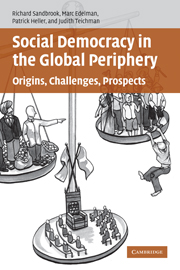Book contents
- Frontmatter
- Contents
- List of tables
- Acknowledgments
- Part I Introduction
- Part II Case studies
- 3 Kerala: Deepening a radical social democracy
- 4 Costa Rica: resilience of a classic social democracy
- 5 Mauritius: evolution of a classic social democracy
- 6 Chile: the tumultuous path to the Third Way
- Part III Patterns and prospects
- References
- Index
3 - Kerala: Deepening a radical social democracy
Published online by Cambridge University Press: 22 September 2009
- Frontmatter
- Contents
- List of tables
- Acknowledgments
- Part I Introduction
- Part II Case studies
- 3 Kerala: Deepening a radical social democracy
- 4 Costa Rica: resilience of a classic social democracy
- 5 Mauritius: evolution of a classic social democracy
- 6 Chile: the tumultuous path to the Third Way
- Part III Patterns and prospects
- References
- Index
Summary
At first glance, the Indian state of Kerala would hardly seem to be a strong candidate for designation as a social democracy. It is, first, a sub-national state, and even if its population of 31 million surpasses that of many European nations, it does not enjoy the macroeconomic powers that have been the key policy instruments of social-democratic pacts. The state in Kerala cannot control the flow of capital, protect its markets, collect income taxes, or adjust interest rates. Second, whereas social democracy is generally associated with industrialized (or industrializing) societies, Kerala remains a largely rural society, with fully one-quarter of its state domestic product coming from agriculture, and three-quarters of its population living in rural areas. The industrial working class, a key actor in the historical formation of European social democracy, remains small, albeit quite powerful. Indeed, Kerala's economy has all the structural markings of the periphery – a large, small farmer agricultural sector, a small and stagnant industrial sector dominated by agro-processing industries such as coir (coconut fiber) production, and a rapidly growing service sector. At a per capita income of $US500, the material base for social democracy is thin at best. Finally, the dominant political party on the left – the Communist Party of India (Marxist) (CPI(M)) – would most emphatically reject the social-democratic label. For all of these reasons, the class-institutional configuration of social democracy – a centrally managed class compromise between capital and labor – appears to be largely missing.
- Type
- Chapter
- Information
- Social Democracy in the Global PeripheryOrigins, Challenges, Prospects, pp. 65 - 92Publisher: Cambridge University PressPrint publication year: 2007
- 1
- Cited by



